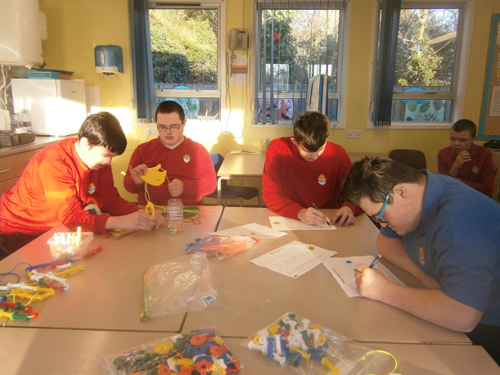Weaving a little magic
Friday 11 March 2016
Every day teachers have to weave a little magic. They have to take the dry words of a curriculum document or syllabus and turn them into engaging and memorable learning experiences for young people.
As teachers working hard to make a difference, we need to enjoy memorable and engaging learning experiences too. While one-off courses and conferences have their place, evidence suggests that the best CPD takes place over time, is focused on real classrooms and involves a degree of collaborative enquiry. That’s why NFER designed the Enquiring Schools approach to professional learning.
Feedback from teachers who are participating in extended classroom-based enquiry projects seems to agree. Simon Wall, Headteacher at Lexden Springs School, says focusing on a few key themes over an extended period of time really helps to deepen engagement, saying “…the level of teacher debate has rocketed in our school.”

Pupils from Lexden Springs School
The one thing that consistently appears near the top of any list about the preconditions needed for CPD success is a sense that time could be made available for it. In the hustle and bustle of school life taking time out to stop, take breath and think can be a rare treat.
In his book Thinking Fast and Slow, Nobel Prize winner Daniel Kahneman explains how the human brain has two modes of thinking. As part of our successful evolutionary inheritance, the brain has become adept at identifying patterns and making generalisations. This pattern-making is really useful as it allows us to act quickly, undertaking many of the routine things we encounter everyday with speed and efficiency. He calls this way of thinking ‘fast’.
Another way of thinking is more deliberative. It involves us slowing down and thinking deeply. We don’t always do this naturally and it takes conscious effort. He calls this way of thinking ‘slow’. For most of our lives thinking fast serves us well. The downside, however, is that we get into automatic thinking routines, and this is not always good.
Dawn Hanwell, a Year 6 teacher from the Aspire Academies Trust, recently noted that participating in an extended project “made me stop and think about what I’m doing. I’ve been teaching a long time and it’s easy to get locked into a routine. The programme has opened me up to try out new things.”
If done well, an Enquiring Schools project provides the slow-thinking space that all reflective professionals need in order to stand back from the all-consuming experience that is day-to-day teaching.
A means to achieve reflective or ‘slow’ thinking
As well as creating time and space, the Enquiring Schools approach encourages participants to engage thoughtfully and critically with the evidence base. Doing so sometimes invites us to reconsider some of the features of schooling that we often take for granted.
For example, as professionals we all seem happy to accept and act upon the evidence that tells us that high-quality feedback is one of the most effective ways to improve outcomes. However, when the evidence indicates that other aspects of schooling, such as ability grouping and school uniforms, have little or even a negative impact on outcomes, there is often less of an appetite to act upon the evidence. It is interesting to ask why some features of schooling become so routine that we hardly ever question their effectiveness.
One aspect of ‘fast’ thinking is something called confirmation bias – which is the tendency to search for and favour the evidence that fits in with our existing beliefs and values. Engaging critically and even-handedly with evidence can help us make more informed decisions and be less susceptible to the fads and fashions that often sweep through the profession. Next time you are listening to a political speech or reading an opinion piece in a newspaper, it is useful to remember that we all have the capacity to fall victim to confirmation bias.
Putting research into practice
Engaging with the research is one thing, applying research in the classroom is another. In the same way that teachers have to translate dry curriculum documents into memorable classroom experiences, they often have to do something similar with the research evidence.
Teachers working on the Enquiring Schools programme are invited to look at the research evidence and explore how it can be applied practically in their own classrooms. They are able to carve out the time to ask: “How do I make this work in my classroom, with my pupils and in my context?” Without this translation the evidence can remain little more than abstract theory. This is something that Julie Nelson explores further in her recent blog.
